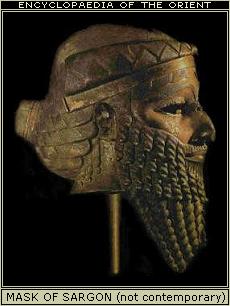
Sargon II (722 BC-705 BC) was an Assyrian king. He took the throne from Shalmanassar V in 722 BC. It is not clear if he was the son of Tiglath-Pileser III or a usurper unrelated to the royal family. In his inscriptions, he styles himself as a new man, rarely referring to his predecessors, and he took the name Sharru-kinu, true king, after Sargon of Akkad, a mighty king who had been found in a wicker basket, a child of a temple prostitute and an unknown father. Sargon is the name given by the Bible.
Sargon preferred Nineveh to the traditional capital at Ashur. In 713 BC he ordered the construction of a new palace and town called Dur-Sharrukin (House of Sargon, Khorsabad), 20 km north of Nineveh at the foot of the Gebel Musri. Land was bought, and the debts of construction workers were nullified in order to attract a sufficient labor force. The land in the environs of the town was taken under cultivation, and olive groves were planted to increase Assyria's deficient oil-production. The town was of rectangular layout and measured 1760 by 1635 m. The length of the walls was 16,280 Assyrian units, corresponding to the numerical value of Sargon's name. The town was partly settled by prisoners of war and deportees under the control of Assyrian officials, who had to ensure they were paying sufficient respect to the gods and the king. The court moved to Dur-Sharrukin in 706 BC, although it was not completely finished yet.
In 705 BC, Sargon fell in a campaign against the Cimmerians, who were later to destroy the kingdoms of Urartu and Phrygia before moving even further west. Sargon was followed by his son Sennacherib
Sargon's Palace
Late in his reign Sargon built himself a new capital city, which he called Dur-Sharrukin ('the fortress of Sargon'), known today as Khorsabad. Among the buildings was a magnificently sculptured palace, which was discovered by the French archaeologist Paul-Emile Botta between 1842 and 1844.
Scriptures
Isaiah 20:1 In the year that Tartan came unto Ashdod, when Sargon the king of Assyria sent him, and fought against Ashdod, and took it.
Sargon's fame is a mixture of numerous occurences in legends, his long reigning period (about 56 years) as well as him forming the first Semitic dynasty in the region, and being the founder of Mesopotamian military traditions.
It appears clear that Sargon was one of the strongest leaders in the known world of this period for more than half a century.
LEGENDS OR TRUTH?
From the legends about his life we learn facts that could just as well be imagination as truth. The story of his life starts with him being found as a baby by a gardener as he came floating in a basket down the river � a story older but similar to the one the Old Testament tells about Moses.
As a youth, he got the position as cupbearer for the king of Kish, one of the countries of Sumer. By hazard he ended up as the ruler of large lands � king Lugalzagesi of Uruk was defeated and Sargon moved in and filled his void. This made Sargon king over large lands, lands that Lugalzagesi had collected. Or rather, Sargon was the theoretical ruler, as he had to defeat every city that tried to break free from his rule. But Sargon succeeded, and the result was the kingdom of Akkad.
The main purpose of controlling cities and lands in Sargon's days was helping trade and hence the living standards at the kings courts. And under Sargon trade thrived, and we learn that his kingdom traded with the Indus Valley (today's Pakistan), Oman and islands in the Persian Gulf. Decorative products like lapis lazuli from today's Afghanistan, cedar wood from Lebanon and silver from the Taurus Mountains were also imported to Sargon's kingdom.
Sargon is supposed to have built the city of Agade, which became his capital. Agade has never been located nor excavated, so this city could well belong to the fictional parts of the legends.
The last decade or so of Sargon's reign was troubled with rebellions. While sources say that Sargon was punished by the gods, modern historical science rely more on a theory that the administration as well as Sargon's own ruling abilities were not strong enough for a large kingdom as his.
But Sargon's successors still proved to be able to bring the empire back together again, and Akkad survived for about 60 years more.